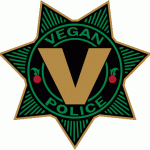 The Vegan Police typically refers to a group of people that go around ‘policing’ vegan practise. There is only one problem… it is not possible to police vegan practise. Instead it is very much up to the individual how they demonstrate veganism within the constraints of modern society. Some things are easier than others, like choosing not to go to an aquarium or zoo. Though perhaps that isn’t so easy if your school is trying to force you to go, which is why we need to be aware of the structural forms of oppression that exist within society.
The Vegan Police typically refers to a group of people that go around ‘policing’ vegan practise. There is only one problem… it is not possible to police vegan practise. Instead it is very much up to the individual how they demonstrate veganism within the constraints of modern society. Some things are easier than others, like choosing not to go to an aquarium or zoo. Though perhaps that isn’t so easy if your school is trying to force you to go, which is why we need to be aware of the structural forms of oppression that exist within society.
There is no 100% vegan, or 99.9% vegan, or 70% vegan, these benchmarks just don’t exist. This is because veganism is essentially unorthodox in a non-vegan world, where we experience varying amounts of privilege (that can make veganism ‘easier’), and have different life experiences that people cannot possibly know about. So the answer here is to be vegan ‘as far as is possible and practicable’, so once we have taken the philosophy on board, we do the best we can to adhere to the practices of veganism:
“A philosophy and way of living which seeks to exclude—as far as is possible and practicable—all forms of exploitation of, and cruelty to, animals for food, clothing or any other purpose; and by extension, promotes the development and use of animal-free alternatives for the benefit of humans, animals and the environment. In dietary terms it denotes the practice of dispensing with all products derived wholly or partly from animals.”
Some people say they don’t want to be associated with veganism because they see it as having negative connotations. But what really seems to be happening here, is that people don’t want to be associated with (for instance) the Beyoncé shaming or the Miley Cyrus shaming that takes place. Part of this issue appears to be based upon media [mis]representation of people we know nothing about. Though where we refer to the behaviour of shaming, of which veganism is just one weapon, it really is something to be appalled by. Yet, it isn’t veganism that is at fault, it is the people who are using it as a stick to hit other people. This form of behaviour appears to be what needs to be called out, rather than sweeping that behaviour behind ‘vegan policing’.
The Vegan Police have also been summoned to describe behaviour toward people that aren’t vegan, which seems to suggest that vegans ought to diminish their advocacy in the face of the dominant culture, and it is fair to say that many omnivores would prefer it that way as well. Sometimes it is easier to ignore people that don’t make a fuss, at the same time, this ‘fuss’ might also trigger omnivores to contemplate issues of animal exploitation. At the end of the day we should be critically supportive of different approaches, recognising that people view the issue of advocacy in different ways, and that we can also adapt our approach to suit different situations.
The Vegan Police have also become a handy tool for people who want to hold onto the vegan ‘label’ whilst choosing to consume animal products, but are uncomfortable that people keep reminding them of the vegan definition. This term was originally coined to oppose animal exploitation as far as is possible and practicable, and if you call yourself ‘vegan’, then that is essentially what you are ‘signing up’ to do. Though it is also worth remembering that it is an ongoing process, rather than a point where we become members of a ‘vegan club’.
When the vegan diet is discussed, it is in reference to products that don’t contain any animal ingredients. However, you can intentionally consume animal ingredients and still be vegan if it is actually essential to do so, or if it is a mistake, where the intent remains to ‘seek to exclude’. But I wouldn’t go on a vegan forum and let people know I had to eat an animal, unless I was explicitly looking for ways to avoid doing that in future. You have to wonder why another vegan would be supportive of animal consumption. That isn’t to say we should shame people in any way, instead we can be supportive and help people look at ways to put their beliefs into practise, making veganism easier for people, and also bearing in mind the society we presently live in, and how that needs to change if we want to see veganism flourish.
Further reading:
‘From animals to anarchism‘ by Watkinson and O’Driscoll (2014).
